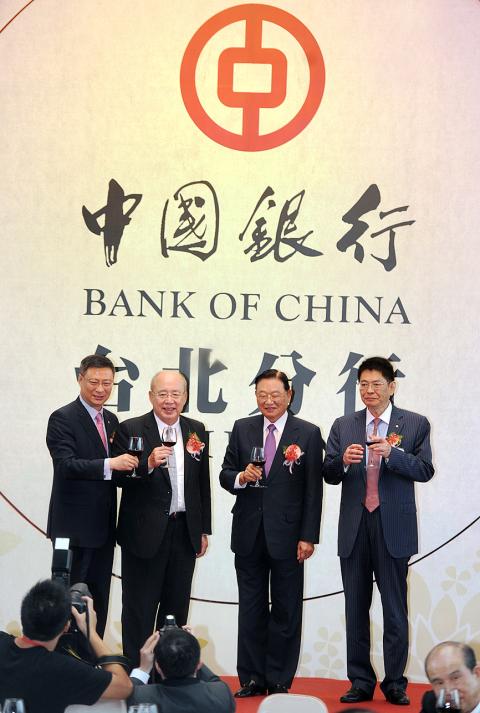Bank of China (中國銀行), the first Chinese lender to set up a branch in Taiwan, aims to forge closer ties with Taiwanese firms with operations in China, including offers of yuan settlement services once Taipei and Beijing work out a mechanism, the lender’s president Li Lihui (李禮輝) said yesterday.
Li, who hosted the official opening of the branch in Taipei, said he met with officials at the central bank and the Financial Supervisory Commission for talks on business development plans.
“As a commercial bank, we hope the two sides can promptly set up a currency settlement mechanism,” Li told a media briefing.

WARNING: EXCESSIVE CONSUMPTION OF ALCOHOL CAN DAMAGE YOUR HEALTH
Photo: Liao Chen-hui, Taipei Times
Bank of China is the world’s top provider of yuan settlement services, which amounted to 803 billion yuan (US$126 billion) for the first five months of the year, Li said.
“We are the main [yuan] settlement bank in Hong Kong, Macau and Malaysia and we hope to extend the services to Taipei once regulatory barriers are removed,” he said.
With cross-strait trade valued at US$160 billion last year and Taiwan’s trade surplus totaling US$89.8 billion, yuan settlement would save Taiwanese firms with cross-strait operations significant foreign-exchange costs and allow them to better control foreign-exchange risks, Li said.
Currently, only designated banking units can conduct yuan exchanges, but they cannot take yuan deposits or provide yuan loans. Further, domestic lenders may provide yuan-related business for corporate clients through their offshore banking units.
The designated banking units have to go through either Bank of Taiwan (台灣銀行) or Mega International Commercial Bank (兆豐銀行) for currency settlements with Bank of China in Hong Kong.
Li said Bank of China plans to provide over 200 billion yuan to help Taiwanese firms expand in China in the next three years.
Potential borrowers are Taiwanese firms that can advance China’s development plans and meet lending criteria, he said.
Li said the Taipei branch would keep close contact with the headquarters of Taiwanese firms with operations in China so the lender can better mobilize its global resources to strengthen services.

Intel Corp chief executive officer Lip-Bu Tan (陳立武) is expected to meet with Taiwanese suppliers next month in conjunction with the opening of the Computex Taipei trade show, supply chain sources said on Monday. The visit, the first for Tan to Taiwan since assuming his new post last month, would be aimed at enhancing Intel’s ties with suppliers in Taiwan as he attempts to help turn around the struggling US chipmaker, the sources said. Tan is to hold a banquet to celebrate Intel’s 40-year presence in Taiwan before Computex opens on May 20 and invite dozens of Taiwanese suppliers to exchange views

Application-specific integrated circuit designer Faraday Technology Corp (智原) yesterday said that although revenue this quarter would decline 30 percent from last quarter, it retained its full-year forecast of revenue growth of 100 percent. The company attributed the quarterly drop to a slowdown in customers’ production of chips using Faraday’s advanced packaging technology. The company is still confident about its revenue growth this year, given its strong “design-win” — or the projects it won to help customers design their chips, Faraday president Steve Wang (王國雍) told an online earnings conference. “The design-win this year is better than we expected. We believe we will win

Chizuko Kimura has become the first female sushi chef in the world to win a Michelin star, fulfilling a promise she made to her dying husband to continue his legacy. The 54-year-old Japanese chef regained the Michelin star her late husband, Shunei Kimura, won three years ago for their Sushi Shunei restaurant in Paris. For Shunei Kimura, the star was a dream come true. However, the joy was short-lived. He died from cancer just three months later in June 2022. He was 65. The following year, the restaurant in the heart of Montmartre lost its star rating. Chizuko Kimura insisted that the new star is still down

While China’s leaders use their economic and political might to fight US President Donald Trump’s trade war “to the end,” its army of social media soldiers are embarking on a more humorous campaign online. Trump’s tariff blitz has seen Washington and Beijing impose eye-watering duties on imports from the other, fanning a standoff between the economic superpowers that has sparked global recession fears and sent markets into a tailspin. Trump says his policy is a response to years of being “ripped off” by other countries and aims to bring manufacturing to the US, forcing companies to employ US workers. However, China’s online warriors